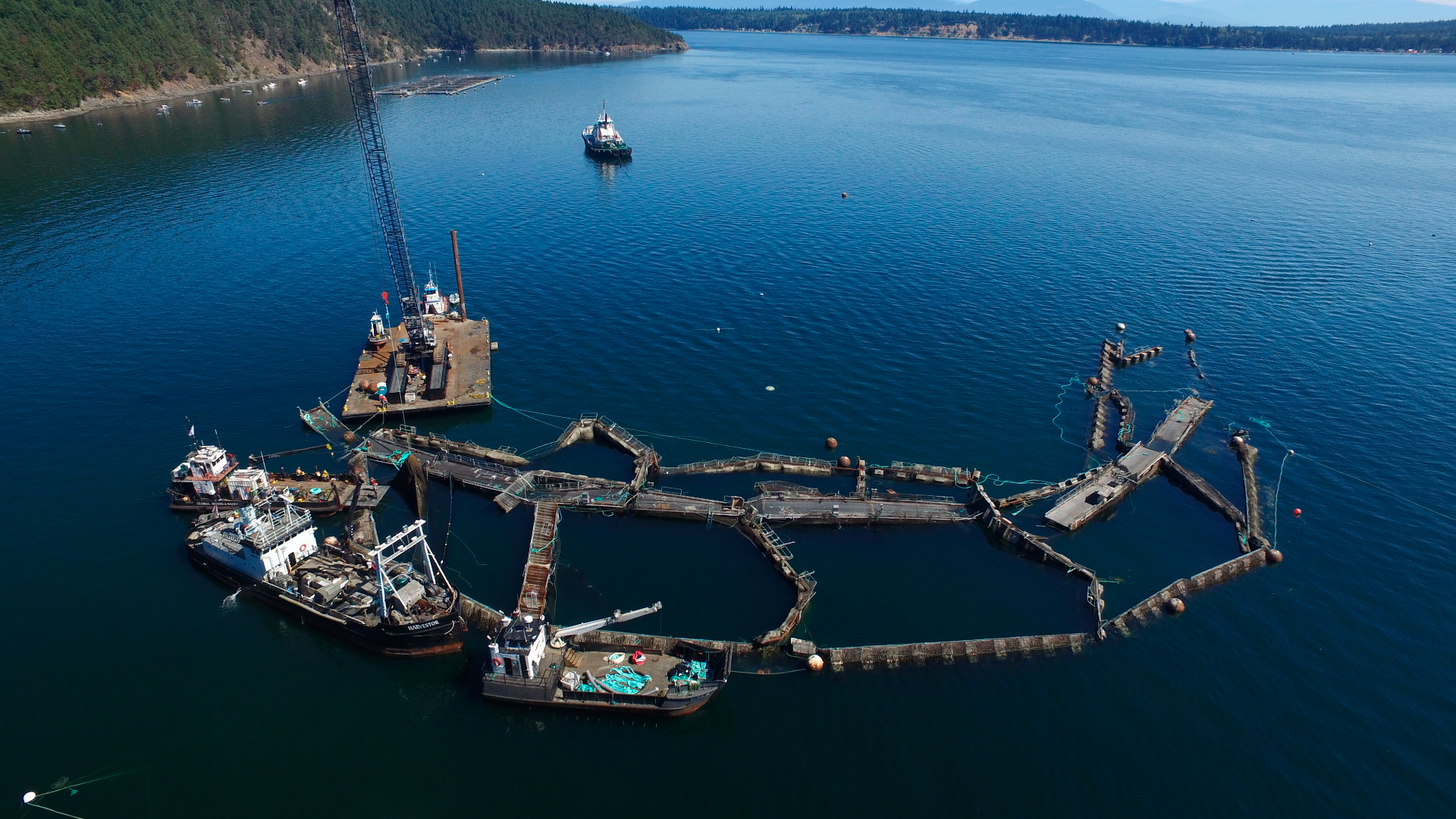Last week, in a move applauded by tribal nations, Washington’s Commissioner of Public Lands Hilary Franz made the announcement that the Evergreen State’s publicly owned aquatic lands will no longer host any open water fish farms.
The Department of Natural Resources is terminating Cooke Aquaculture’s remaining two finfish net pen aquaculture facilities leases. The company will have a few weeks “to finish operations and begin removing its facilities and repairing any environmental damage,” the agency said on November 18th.
“As we’ve seen too clearly here in Washington, there is no way to safely farm finfish in open sea net pens without jeopardizing our struggling native salmon,” Franz said in a statement. “Today, I’m announcing an end to the practice.”
“We, as a state, are going to do better by our salmon, by our fishermen, and by our tribes. Commercial finfish farming is detrimental to salmon, orcas and marine habitat. I’m proud to stand with the rest of the west coast today by saying our waters are far too important to risk for fish farming profits.”
This decision has been a long time coming. Environmentalists, fishermen, tribes and others have worked for decades to get fish farms out of Washington’s waters.
“After the incredible news announced earlier this week, it is almost impossible to believe we are now celebrating an even bigger, groundbreaking victory for our wild salmon, orcas, and the health of Puget Sound,” said Emma Helverson, Executive Director of Wild Fish Conservancy, in a press release. “By denying new leases to Cooke and bringing forward this comprehensive, bold new policy to prevent commercial net pens from ever operating in Washington marine waters again, Commissioner Franz is ensuring Puget Sound will be protected, not just now, but far into the future for the benefit of generations to come.”
“This ends a long history of industry ‘spokespeople’ who have been involved with Marine Resources Committees both in Clallam and Jefferson Counties, touting the benefits of these pens and disrupting anyone coming forward to raise concerns, such as when Professor Dill, a researcher from a distinguished Canadian University came to Port Angeles a few years ago to discuss his scientifically based concerns and was shouted down by industry representatives,” wrote Al Bergstein, editor and publisher of the Olympic Peninsula Environmental News.
If you’d like a refresher on the destructive ramifications of open net pen fish farms, the David Suzuki Foundation has a good primer at its website.
“A 2021 University of British Columbia study confirmed that farmed fish are transferring PRV to wild salmon, and found that proximity to fish farms increases the likelihood of wild Chinook being infected,” a May 5th post documenting the suppressed science explains. “One of the original DFO study’s authors, federal biologist Kristi Miller-Saunders, called the delay a ‘travesty’ that has contributed to ongoing doubt about viral impacts of fish farms on wild salmon.”
An executive for Cooke Aquaculture said the company is unhappy.
“Cooke Aquaculture Pacific was very disappointed to receive the Washington Department of Natural Resources (DNR) notices not to renew our two steelhead fish farming leases in Rich Passage off Bainbridge Island and off Hope Island in Skagit Bay. Regulators and policymakers must responsibly follow the science and judicial precedents in making key decisions regarding marine aquaculture, which we do not believe was the case in this instance,” said Cooke VP Joel Richardson.
Hopefully, we have reached the point where we can finally put this destructive practice to rest in Washington. That leaves British Columbia, where the industry has a much larger presence. Fish farms in B.C. are also slated to be phased out, but will the province follow through and give companies like Cooke the boot?
Remember salmon originating from and returning to their home rivers and streams along the Pacific west coast, cross borders, mingle and migrate far off shore, so it matters what happens in British Columbia.
California, Oregon, and Alaska thankfully never allowed the fish farm industry to set up shop in their waters. Only Washington and British Columbia did.
Even after fish farms are finished being banished from the Salish Sea, a boomlet of industrial offshore facilities being developed around the world could still threaten the marine waters of the Pacific Northwest.
While it is a big relief to see our aquatic lands liberated from Cooke’s messy and harmful operations, the threat of fish farms is not gone.
Activists, tribes, and governments will need to work together to protect the world community and Earth’s oceans from this problem for years to come.

